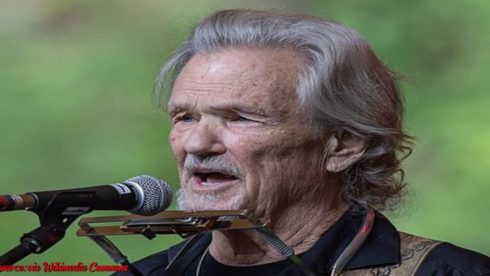Kris Kristofferson, renowned for his multi-faceted career as both a legendary country music singer-songwriter and a celebrated Hollywood actor, has passed away at the age of 87. His death marks the end of an era, as Kristofferson was one of the most influential figures in American culture, known for bridging the gap between music and film. Kristofferson’s music deeply resonated with generations, touching on themes of love, freedom, and personal struggle. His distinct raspy voice and poetic lyrics earned him a devoted fan base across genres, from country to rock and beyond.
Beyond his success in music, Kris Kristofferson left a lasting legacy in Hollywood. He starred in numerous critically acclaimed films, such as A Star is Born (1976), Convoy (1978), and Blade (1998), showcasing his versatility as an actor. With his rugged good looks and brooding persona, Kristofferson was a quintessential star of the 1970s, embodying a rebellious yet soulful spirit. His death not only marks the loss of a brilliant artist but also a cultural icon who influenced countless musicians and actors in his wake.
A Songwriter for the Ages
Kris Kristofferson’s contribution to country music cannot be overstated. He penned some of the most iconic songs of the 20th century, including “Me and Bobby McGee,” famously covered by Janis Joplin, and “Sunday Mornin’ Comin’ Down,” which became a hit for Johnny Cash. His songwriting was characterized by a raw authenticity, often exploring themes of heartache, redemption, and the human condition. Kris Kristofferson’s songs spoke to the everyman, blending storytelling with philosophical musings in a way that set him apart from his contemporaries.
Kris Kristofferson’s knack for songwriting wasn’t confined to his own performances. Many of his songs were covered by major artists, cementing his influence across the music industry. As a member of the Country Music Hall of Fame and a recipient of the Grammy Lifetime Achievement Award, Kristofferson’s place in the pantheon of great American songwriters is undeniable. His passing leaves a significant void in the world of music, as fans and fellow musicians mourn the loss of a true wordsmith.
A Unique Path to Stardom
Unlike many of his peers, Kris Kristofferson’s journey to fame was far from conventional. Born in Brownsville, Texas, in 1936, he initially pursued a military career, graduating from West Point and serving as a helicopter pilot in the U.S. Army. However, his passion for music and writing led him to resign his commission and move to Nashville, where he worked as a janitor at Columbia Recording Studios while honing his craft as a songwriter. His decision to leave a promising military career behind for the uncertainty of music was a testament to his deep commitment to his art.
Kris Kristofferson’s break came in the 1960s when artists like Roger Miller and Johnny Cash began recording his songs. His own debut album, Kristofferson (1970), marked the start of a prolific music career, while his role in A Star is Born opposite Barbra Streisand established him as a serious actor. Kristofferson’s life story reads like a classic American narrative—one of risk, reinvention, and an unwavering belief in the power of creativity.
His Legacy in Film: A Cinematic Chameleon
Though Kris Kristofferson is often remembered first for his music, his acting career was equally illustrious. He made a seamless transition to film in the 1970s, appearing in a string of popular and critically acclaimed movies. His role as John Norman Howard in A Star is Born earned him a Golden Globe for Best Actor, solidifying his status as a leading man. His portrayal of troubled, complex characters resonated with audiences, as Kristofferson brought a raw vulnerability to the screen, making his performances unforgettable.
In addition to his work in A Star is Born, Kris Kristofferson became a frequent collaborator with iconic directors like Sam Peckinpah, starring in Pat Garrett and Billy the Kid (1973) and Bring Me the Head of Alfredo Garcia (1974). His rugged charisma and ability to convey depth through subtlety allowed him to play a wide range of roles, from cowboy outlaws to futuristic vampire hunters in the Blade franchise. Kristofferson’s filmography is a testament to his versatility and enduring appeal as an actor.
Awards and Accolades: A Star on Every Stage
Over the course of his career, Kris Kristofferson garnered numerous awards and accolades across both music and film. In music, Kristofferson was a four-time Grammy Award winner and was inducted into the Country Music Hall of Fame in 2004. His songwriting prowess earned him the admiration of peers and critics alike, as well as the BMI Icon Award in recognition of his lasting influence on American music. His songs were regularly cited as some of the best examples of narrative-driven songwriting, with his contributions continuing to inspire musicians today.
On the acting front, Kristofferson’s Golden Globe win for A Star is Born remains one of his most memorable achievements. However, he was also a recipient of several lifetime achievement honors, including the prestigious Johnny Cash Visionary Award. Kristofferson’s ability to leave a lasting impact in both film and music makes him one of the few artists to successfully navigate both industries, earning him the admiration of fans worldwide.
Remembering Kris Kristofferson: A Cultural Titan
Kris Kristofferson’s death has reverberated throughout the entertainment world, with tributes pouring in from artists, actors, and fans alike. His influence spans multiple generations, with his music continuing to be covered by contemporary artists, and his films remaining beloved classics. Kristofferson’s ability to tap into the human experience through his art ensured that he remained relevant across decades, never fading into the background despite the constant evolution of both the music and film industries.
In remembering Kristofferson, it’s important to celebrate not just his professional achievements but the ethos he embodied. He was a man who pursued his passions fearlessly, breaking away from societal expectations to follow his own path. In doing so, Kristofferson became a cultural titan—a man whose work touched lives and whose legacy will continue to inspire. His passing marks the end of a chapter in American entertainment, but his songs, films, and spirit will live on, continuing to influence future generations.














